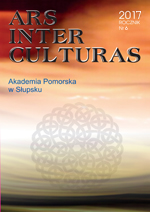SZCZĘŚLIWE ZIEMIE RUSI CZERWONEJ W KREACJACH LITERACKICH WYBRANYCH POETÓW RENESANSU I BAROKU
HAPPY LANDS OF RED RUTHENIA IN SELECTED RENAISSANCE AND BAROQUE POETS’ LITERARY CREATIONS
Author(s): Krystyna Krawiec-ZłotkowskaSubject(s): Politics / Political Sciences, Language and Literature Studies, Cultural history, Sociology of Art
Published by: Wydawnictwo Naukowe Akademii Pomorskiej w Słupsku
Keywords: Red Ruthenia; Ruthenian nature; poetic affiliations with European poetry; convention; tradition; music; dances; „Padua” pieces; bucolics; renaissance poem; Sebastian Fabian Klonowic; Szymon Zimorowic
Summary/Abstract: In the study Happy Lands of Red Ruthenia in selected renaissance and baroque poets’ literary creations there were explored associations of literary space with European po- etry’s tradition, especially Italian, as well as with native tradition vested with local habits and ceremonies. Those affiliations created in Sebastian Fabian Klonowic, Szymon Zimo- rowic and Józef Bartłomiej Zimorowic’s chosen pieces. Studies contained Sebastian Fa- bian Klonowic’s poem Roksolania czyli ziemie Czerwonej Rusi and Zimorowic brothers’ poetic cycles Roksolanki and Sielanki nowe ruskie. Thematics of those pieces pertain to space and tradition of Red Ruthenia, however it is possible to indicate affiliations with Mediterranean culture in them (especially in context of conventional speech poetics connected with mythological and mythical literary tradition). Analyzed pieces confirm that renaissance and baroque’s culture of former Republic of Poland shaped under the influence of European heritage. At the same time, for Mediterra- nean those pieces could become a source of inspiration (for example Zimorowic brothers’ bucolic cycles correspond with music and former dances) or knowledge (Klonowic’s poem shows unknown areas of Republic of Poland’s southeast borders for European reader).An image of nature and Red Ruthenia’s literary landscape, which appears in thosepoets’ works, places their legacy in the circle of convention, tradition and universal values.
Journal: Ars Inter Culturas
- Issue Year: 2018
- Issue No: 7
- Page Range: 121-144
- Page Count: 23
- Language: Polish

